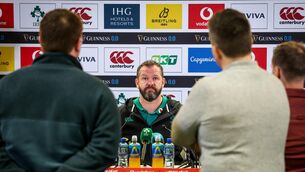Donal Lenihan: If Ireland's off-loading game clicks today, Scots in deep trouble

Bundee Aki during Ireland Rugby Captain's Run, at the Aviva Stadium,
IN many ways, it’s been a strange championship for Ireland, with questions of an entirely different nature asked of the team in the last two games. If playing against 13 men from the second quarter onwards spooked Ireland somewhat against Italy, seeing England permanently reduced to 14 men 82 seconds into last weekend's clash in Twickenham transformed the home team into men possessed.












